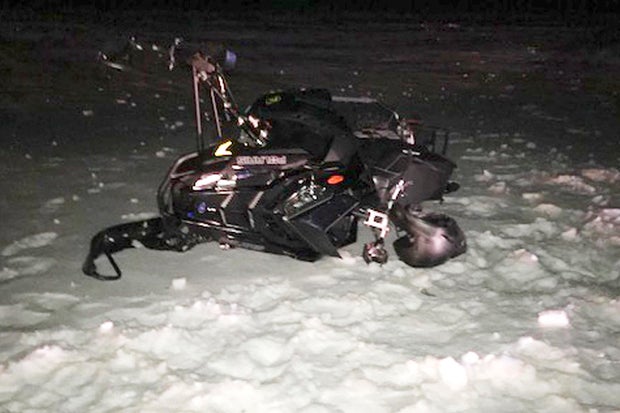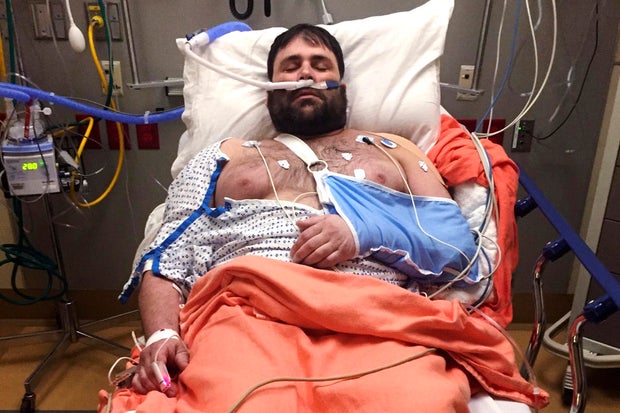Snowmobiler who crashed into parked Black Hawk helicopter awarded $3 million
Updated on: September 25, 2024 / 10:17 AM EDT / APA judge ruled that the federal government was mostly responsible for a nighttime collision that nearly killed a snowmobiler who struck a Black Hawk helicopter that was parked on a Massachusetts trail.
U.S. District Judge Mark Mastroianni blamed both parties for the March 2019 crash in his ruling Monday, but said the government was 60% responsible for parking the helicopter on a snowmobile trail. He criticized snowmobiler Jeff Smith for not operating the craft safely, for speeding and for wearing tinted goggles, but awarded him $3.3 million in damages.
Smith, a Massachusetts lawyer, had asked for $9.5 million in damages to cover his medical expenses and lost wages and to hold the military responsible for the crash.

"We are grateful for Judge Mastroianni's thoughtful consideration of the complicated facts of this case," Smith's lawyer Doug Desjardins said. "We believe justice was served, and the decision encourages public safety."
The government has 60 days to pay Smith or appeal, Desjardins said. The government did not immediately respond to a request for comment Tuesday.
Smith's lawyers argued that the crew of the Black Hawk helicopter that flew from New York's Fort Drum to Worthington, Massachusetts, for night training was negligent for parking the camouflaged 64-foot aircraft on a rarely used airfield also used by snowmobilers.
"The court finds the government breached its duty of care in failing to take any steps to protect against the obvious risk of a camouflaged helicopter parked on an active snowmobile trail, in a somewhat wooded area, as darkness set," Mastroianni wrote. "The helicopter and area where it was parked were not illuminated or marked in any way."
Smith also sued the owner of Albert Farms airfield in Worthington, accusing them of both giving permission to snowmobilers to use the trail and the Black Hawk crew to land in the same area. He settled with the farm owner for an undisclosed sum.
"I remember him gasping for breath"
Smith, who was airlifted to a trauma center with a dozen broken ribs, a punctured lung and severe internal bleeding, has been surviving on disability assistance. The 48-year-old struggles with simple tasks, including putting on socks or pulling up his pants. He no longer golfs or snowmobiles."It was a mess," he said.

His lawsuit argued that the helicopter crew didn't do enough to protect him, including failing to warn snowmobilers of the Black Hawk's presence on the trail, leaving the 14,500-pound aircraft briefly unattended and failing to illuminate it. The helicopter landed on an air strip approved by the Federal Aviation Administration and the crew members testified that trainings are often conducted in similar locations. But Smith, who said he had snowmobiled on the trail more than 100 times, said the last time an aircraft used it was decades ago when he was a child — and never a military aircraft.
The government attempted to dismiss the case several times, arguing that it could not be sued under the Federal Tort Claims Act because a policy decision was involved. But the judge disagreed and said the act allows for exceptions.
The government also argued that the court lacked jurisdiction and that the crew members weren't told that they were landing on a snowmobile trail. The government also pushed back on claims that it could have prevented the accident and said the crew was not required to illuminate the helicopter. The government also attempted to cast blame on Smith, claiming he was driving his sled at more than 65 mph and that he had taken both prescription drugs and drank two beers before his ride.
In its investigation, the Army concluded the crew members weren't aware they were landing on a snowmobile trail. It also questioned whether glow stick-like devices known as chem lights used to light up the craft would have made a difference.

The night of the accident, Smith said he was over at his mom's helping fix a computer. He had a beer with dinner and another with his dad before setting off to meet his brother, Richard Smith, on the trail. Jeff Smith drove in the dark alongside farm fields and forests before going over a ridge. His headlights reflected off "something," he said, but Smith only knew it was a helicopter after the crash.
"I found him face down in the snow," Benjamin Foster, one of the crew members, told the court. "We rolled him on his back and I might remember yelling or telling one of my crew chiefs to grab some trauma shears and space blankets from the aircraft. ... I remember him gasping for breath."
"As soon as I heard that somebody on a snowmobile hit the helicopter, I knew it was my brother," Richard Smith said. "My heart hit my stomach. I just knew it was him. I went down there and my father told me he was alive. I didn't sleep that night. I spent that night on my knees praying."

Snowmobiler who crashed into parked Black Hawk helicopter awarded $3 million
Jeff Smith nearly died in 2019 after hitting a Black Hawk helicopter that was parked on a Massachusetts trail.



